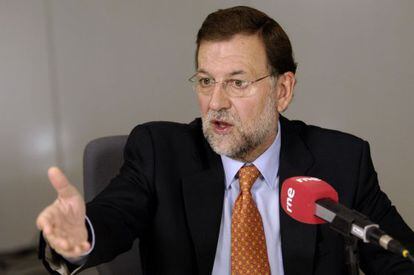Rajoy mulls strike law reform to guarantee minimum services
PM says Popular party has “made mistakes” in handling of Bárcenas corruption affair Conservative leader defends reforms and says education minister “has complied with electoral program”


Speaking at the halfway point of the current legislature in a rare interview granted to state radio station RNE, Prime Minister Mariano Rajoy held forth on a range of subjects encompassing proposed social reforms, the Melilla border fence, his relationship with national and international political figures and the Bárcenas affair: “I hope that a case like this never happens again,” he said of the judicial investigation into an alleged system of illegal financing and cash payments to top Popular Party (PP) officials, including himself, under the aegis of former party treasurer Luis Bárcenas, who is in preventive custody. “Could we have handled the situation in a better way? Yes, but you also learn from your mistakes,” the prime minister said.
Street-cleaners' strike
Following the recent street cleaning strike in Madrid, which finally drew to a close last weekend, Rajoy said he was in favor not of introducing legislation to stymie stoppages but rather gain assurances that minimum services will be met. “I have asked that it be looked into,” he said. “To make the right to strike and the liberty of citizens compatible.” Since a 1977 decree was introduced regulating strike action, no prime minister, Socialist or conservative, has dared to tamper with it, despite calls from some sectors of the PP to apply limits. Rajoy and Labor Minister Fátima Báñez will seek a middle road to ensure that minimum services are met, in response to Madrid Mayor Ana Botella's complaint that they were not adhered to during the cleaning strike.
Right to protest
Rajoy also defended the PP's proposed Public Safety Law, which was announced this week to derision from opposition parties who feel it will curb the rights of citizens to protest freely. Among the proposals in the legislation is to levy fines of up to 600,000 euros on people demonstrating without permission outside Congress, regional assemblies and City Halls. “The draft bill will be presented next week. It is not more repressive; many things that were considered crimes will be downgraded and therefore will be punishable by fines. The figure of 600,000 euros is in the previous law and it is only applicable to those people who protest without prior authorization or who obscure their identities. It is in line with all democratic countries.”
Education and health
On the hugely controversial education reforms laid out in the so-called Wert Law, named for Education Minister José Ignacio Wert, which has led to mass demonstrations and a series of strikes in the sector, Rajoy said his minister enjoyed the full support of the government. “Wert has complied with the PP's electoral program. He has been very courageous. We did everything in our power to negotiate the law [with the opposition] but they did not wish to.”
Quizzed on the state of the Spanish public health system, Rajoy replied that it was “among the best in the world and will continue to improve.” Privatization plans for six hospitals in Madrid have also provoked huge demonstrations, but Rajoy would not be led into the debate: “I think the best model is the one that cures people,” he said. “It doesn't matter if this hospital or that hospital provides the service; what is important is that it is free. I have used both the public and private systems.”
"No ETA negotiation"
The prime minister also echoed the words of his justice minister, Alberto Ruiz-Gallardón, in stating that the public should not reproach Spanish judges for applying a European Court of Human Rights ruling on sentencing that has led to the release of over 30 ETA inmates and several rapists and murderers. Rajoy noted that the same judges that are compelled to apply “a European ruling” are those that had previously sought to put dangerous criminals behind bars. He also had a firm statement for the terrorist organization, which announced an end to armed activity two years ago but has yet to hand over its weapons and disband completely. “If ETA is waiting for the government to make a move, it is not going to happen. What we are waiting for is its dissolution. There will be no negotiation.”
Melilla fence
In response to calls from opposition deputies to halt the installation of a layer of razor wire to the six-meter border fence in Melilla, the prime minister said he had ordered a report on the situation. The measure has been taken in the face of concerted massed attempts to scale the fence, one of which recently resulted in the death of a would-be immigrant who fell from the top of the barrier. I don't know if the wire can injure people or not. We have to look into it. We have to protect the border and also people.”
Obama visit
Finally, Rajoy said that he enjoyed “excellent” relations with former PP Prime Minister José María Aznar, who has been vocal in his criticism of his successor's policies and who last week launched his memoirs at an event in Madrid given a wide berth by the entire current party hierarchy. The prime minister said he also speaks regularly with Socialist leader Alfredo Pérez Rubalcaba on a variety of issues and that Spain's ties with the USA are “very good,” in the wake of the NSA spying scandal that caused outrage across Europe. “I have met Obama several times. We still lack the official visit to Washington. It will take place next year, in the first quarter.”










































